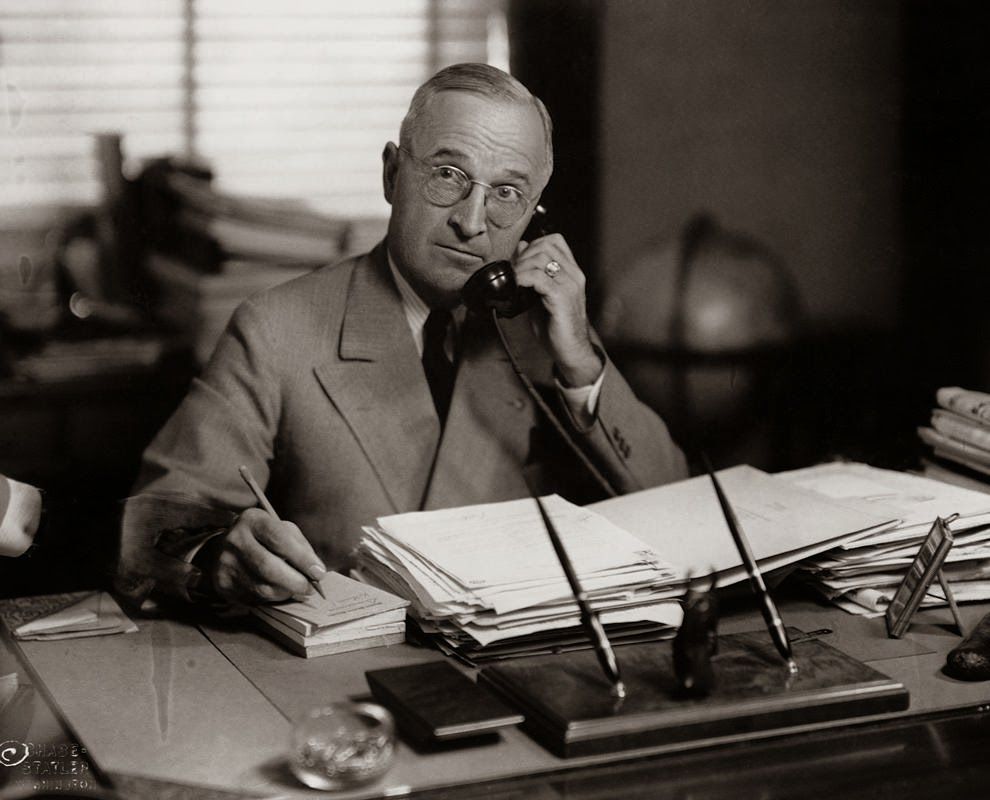Most people believe you’ll need a college degree to succeed. For people who struggle to achieve this educational attainment, this “fact” could be a downer. But take heart; success stories don’t always require a college degree.
A popular figure in the U.S. government can attest to that. Who is the most recent U.S. president without a college degree?
The President Without a College Degree
That would be Harry Truman — the 33rd president of the United States of America. He assumed office following the death of his predecessor Franklin Roosevelt (1882-1945). Truman is known for implementing the Marshall Plan to rebuild Western Europe’s economy, establishing the North Atlantic Treaty Organization (NATO) and presiding over the end of World War 2.
On the other side of the spectrum, he is least known as one of the last presidents without a college degree. In fact, he is the only U.S. president in the 20th century who didn’t finish his tertiary studies. But his lack of degree did not keep from him being well-read or well-educated.
So if you’re without a college degree and wondering if succeeding in business or education is possible, take heart. Harry Truman, one of the presidents without a college degree, offers encouragement via his life.
Truman’s Education: What Happened to His Degree?

Truman, the son of John Anderson Truman ( who was not just a farmer but a livestock trader, too) and Martha Ellen Young Truman, attended public schools during his formative years. Should he be classified under a modern schooling stereotype, he was the “nerdy” boy, wearing thick eyeglasses to support his poor vision and unable to play sports because of it.
Truman’s poor vision did not stop him from pursuing his love of learning. The young Truman’s mother taught him how to read by the age of five. When he started first grade at eight years old, Truman was ahead of his peers. He studied hard, read plenty of books and did quite well in school.
Unfortunately, diphtheria kept the young Truman from finishing the second grade with his peers. He managed to catch up by attending summer school. He worked so ahead that he ended up skipping the third grade and went straight into the fourth.
After graduating high school in 1901, Truman wanted to attend West Point, the country’s premier military academy, to achieve his military dreams. His poor eyesight, however, prevented him from doing so. Instead, Truman attended Spalding’s Commercial College to study business.
This, however, was not a fruitful pursuit. Due to his family’s lack of money to pay for college, Truman only lasted a semester before dropping out. His parents were poor farmers who couldn’t afford college. Therefore, as much as they wanted to send him to school, they couldn’t.
Instead of studying, he worked in the mailroom of the Kansas City Star newspaper. Starting in 1906, the young Truman spent more than ten years helping his father manage their farm. Here, he was in charge of monitoring their finances, as well as performing some manual labor.
In 1923, Truman decided to give college another go by taking night classes at the Kansas City School of Law (now known as the University of Missouri-Kansas City School of Law). Unfortunately, he had to drop out again after he lost his administrative government post with the Jackson County Court.
What You Can Learn from Truman’s Education

Learning never stops — this seems to be the late president’s mantra when he was in or out of school. Truman was always intrigued by historical figures, with Andrew Jackson being one of his favorites.
According to Jim Armistead, presenter of the talk “Harry’s School Days: The Education of a Future President,” Truman wanted to know why and how these figures succeeded or failed.
Truman also read about five newspapers each morning so that he would always be well informed. When making an important decision, the late president consults with different people to get their opinion on a subject.
Cliché as it sounds, learning is indeed crucial to any successful venture. If you wish to start a small business at home, the first step in doing so is to learn about your niche, target market and competitors. Once you’ve determined these factors, the learning doesn’t stop. You now have to learn about equipment that promotes business productivity, the latest trends in your niche and risk management strategies. After learning this, your to-do list of learning skills continues.
Setbacks and the lack of degree did not stop Truman from pursuing his thirst for knowledge.
Another notable lesson is Truman tried and never gave up. In terms of higher education, he was aware of their importance. Obligations kept him from finishing them but at least he tried, as proven by his second attempt in 1925.
The fact that he tried — it says much about his determination. Trying is a concept in terms of education and business that comes off a risky or downright scary. What if you fail? What if this attempt at a new business venture doesn’t guarantee ROIs? These worries are valid but it’s better to have done something than none at all.
In Truman’s case, he might have never gotten a degree. But he ended up as the president who was instrumental in passing legislation that aimed to establish more community colleges.
Truman as a Businessman: No Degree, No Problem

Truman is a scion of real estate wealth. Solomon Young, his maternal grandfather, struck gold in Gold Rush-era California, enabling him to build an estimated 40,000-acre ranch. It would have been worth millions had Young not sold it before the rise of land values. As a result, young Truman never got a taste of his grandfather’s wealth.
Still, he searched for business opportunities upon his return from Europe after fighting in the First World War. During this time, Truman was living in Independence, MO with his socially prominent wife, Bess. When he was 35, Truman partnered with Eddie Jacobson, his poker buddy and friend from the army, to start a haberdashery in Kansas City.
Believe it or not, the late president’s business venture saw him selling celluloid collars, shirts, gloves, neckties, belts, Panama hats and underwear across the famous Muehlebach Hotel. Truman was the accountant while Jacobson served as the buyer. The partners took out many loans to get the store up and running, and initially, they saw returns on their investment.
An economic downturn, however, poured cold water on the pair’s business plans. In September 1922, Truman and Jacobson were forced to close their clothing shop, leaving them bankrupt and in debt.
Despite the store’s financial failure, Truman gained social benefits from this business venture. He maintained a network of acquaintances and friends from the National Guard. His status as a respected businessman gave him instant access to civic organizations and veterans groups.
This status gave him the jumpstart he needed for his career in politics. In 1922, Thomas J. Pendergast, a Democratic leader in Kansas City and an uncle of one of Truman’s war pals, encouraged Truman to run for a judgeship in Jackson County. Thanks to his good reputation and strong network, Truman won the judgeship — starting his political run.
What You Can Learn from Truman’s Business Journey

A college degree can take you to places. But hard work and a good reputation can take you to more places.
In terms of dealing with debt, Truman handled the situation like a champ. During the last days of his haberdashery, Truman was forced to hold a “fire sale” so they can pay off their debts little by little. Both he and Jacobson promised that eventually, they would pay everyone in full. And they kept that promise.
A decade later, Truman repaid a bank at less than 10 cents on the dollar. He was already a senator during this time.
So what’s the lesson there?
Stick to your word. Keeping a promise is a crucial building block to a stronger reputation. A good reputation earns you the trust of potential partners, who are essential in manufacturing, marketing, logistics and more. Also, credibility is essential in earning more customers. After all, consumers will only go to businesses that they can trust.
Although Truman couldn’t escape accusations of corruption due to his association with Pendergast, he still built a good reputation for honesty, integrity and efficiency. He genuinely aimed to promote efficiency in the local government. Just as important, Truman’s years as a politician saw him proving to others that he can be an authoritative figure who could win support from rural and urban — including ethnic and black minorities — constituencies.
Truman didn’t need a degree to learn from his mistakes, too. His personal experience with financial failure made him more conservative in dealing with the country’s finances. He had every right to say he felt the suffering of Americans when the executive branch makes economic mistakes.
Learning from previous mistakes is essential in sealing the success of your business. For example, if an investment in a potential partner didn’t work out, you know better. Next time, you can find other (if not better) sources of investment. The search might be daunting, especially if you aren’t too keen on failure. But lessons from your mistakes can help you navigate your business journey towards a better path.
The Bottom Line

How many U.S. presidents didn’t go to college? Twelve, Harry Truman included. All of them — despite the lack of a degree — contributed to the growth of the country.
What does this say?
It’s not about what you earned; it’s about how you earned your milestones. Granted, a college degree is still important in securing dream jobs. But if your situation did not allow for it, do not give up. Instead, use your resources and think. Strategize. Remember: there is no one way to succeed. Some ways are better than others; what matters is you carve a straightforward path that directs you to your goals.
If a president without a college degree can succeed, so can you.



